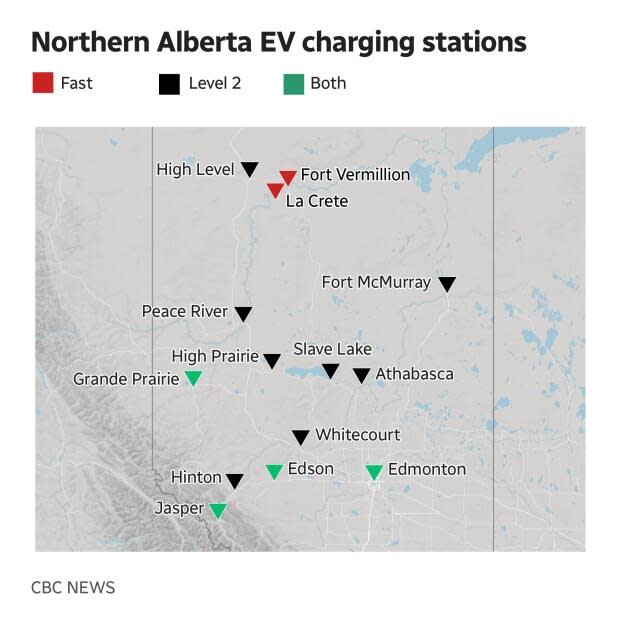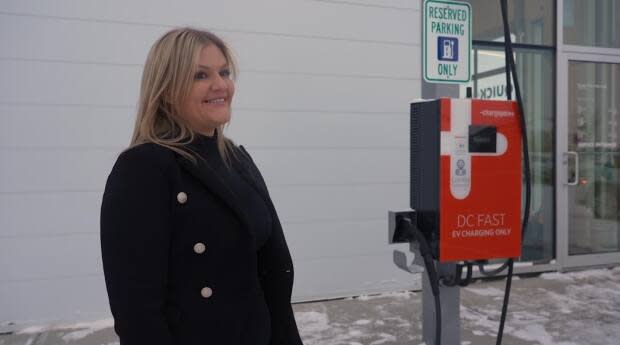Northern Alberta EV driver says charging infrastructure needs a boost

A northern Albertan electric vehicle owner says he feels like his SUV is restricted to city limits this winter due to a lack of fast charging infrastructure along Highway 43.
Keith Gropp purchased a Ford Mustang Mach-E in May 2021. He says it's comfortable to drive around Grande Prairie in winter, but colder weather also means the battery life is about half.
"It's more or less a city vehicle in the winter and in the summer, you can go pretty far with it," Gropp said
To make long trips quicker, Gropp said he would like to see fast-charging infrastructure every 100 to 200 kilometres along Highway 43, which connects Grande Prairie with Edmonton.
3 types of chargers
There are three types of chargers for electric vehicles, according to Natural Resources Canada.
Level 1, the slowest, works on alternating current (AC) and requires only a standard 120-volt wall outlet.
Level 2 AC chargers are faster. They require a 208-volt or 240-volt wall outlet, the same as dryers, ovens and air conditioners.
Level 3 direct current (DC) chargers are the fastest. They are typically found in public places and at businesses.
The 450-kilometre stretch of road to Edmonton has one public charging facility, according to the EV charging map website PlugShare.
About halfway through the drive, Eagle River Tourism RV Park in Whitecourt allows electric vehicle drivers to use their Level 2 chargers year-round, for $10 a charging session.
Using them could mean an hours-long pit stop for EV drivers.
"We've had them anywhere from an hour to some of them have stayed for like eight hours," said Eagle River park attendant Gerald Schutte.

According to PlugShare, there are detour options north through High Prairie, which has two Level 2 chargers, or south through Edson, where there are two fast chargers.
Still, Gropp prefers staying on Highway 43, even though that route means planning for a longer charging stop. If he chose to take the southern detour, he could charge up in Edson in less than an hour.
'Corporate will'
Andrew Bell, a director with the Electric Vehicle Association of Alberta, said there are projects in the works to help drivers in northern Alberta charge faster. He said the Fort McMurray to Edmonton corridor is another route that needs better service.
"Once we get north of the capital city of Edmonton, the opportunities to charge are much less frequent," said Bell, who drives a Tesla.
Bell said Level 2 chargers are more common because they're cheaper to install than fast chargers, which can cost around $100,000.
"It's really just the will, the corporate will to get behind this and see it done," he said.
There are about a dozen public places to charge electric vehicles in the city of Grande Prairie, including one fast charger at the Volkswagen dealership.

"We've had it actually longer than we've even announced our ID.4, which is the new electric Volkswagen," said Paige Shelton, a sales and leasing consultant.
Grande Prairie Volkswagen has had a fast charger since January 2020. Shelton said the charging station is free for electric vehicle drivers with compatible cords to charge up.
"A lot of people come directly to this. They see it on their app and they find out that we are the only dealership that does have this," Shelton said.
She said the charging station is currently used only about a month, but that is increasing as more drivers purchase electric vehicles.
Still, drivers hope there is better charging infrastructure along northern Alberta highways soon.
In the meantime, Gropp will be hanging onto his gasoline SUV in case he needs to make it to Edmonton in a timely fashion.
"It's better than a gas vehicle in every way except for the range," Gropp said of his electric Mustang.


